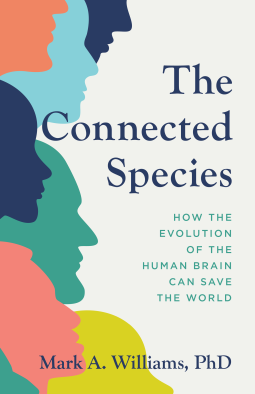
The Connected Species
How the Evolution of the Human Brain Can Save the World
by Mark A. Williams
This title was previously available on NetGalley and is now archived.
Send NetGalley books directly to your Kindle or Kindle app
1
To read on a Kindle or Kindle app, please add kindle@netgalley.com as an approved email address to receive files in your Amazon account. Click here for step-by-step instructions.
2
Also find your Kindle email address within your Amazon account, and enter it here.
Pub Date Aug 15 2023 | Archive Date Aug 15 2023
Rowman & Littlefield | Rowman & Littlefield Publishers
Talking about this book? Use #TheConnectedSpecies #NetGalley. More hashtag tips!
Description
Human beings have succeeded as the most dominant species on earth in large part due to our need to connect and cooperate. It was our ability to socialize and connect that catapulted our species to phenomenal heights of innovation, through collaboration and specialization. This drive has fine-tuned our unconscious perception of faces, facial expressions, body language, and touch. Our primitive drive to connect changes how we perceive the world and the people around us. We see, hear, empathize with, and understand others differently depending on whether they are a member of our in-group or not. This unconscious drive to connect can draw us together, but it also emphasizes the differences between groups. And it is getting worse, as overcrowding, technology, and the media often focus us on our differences. We become more and more divided into groups as a result.
Here, Mark Williams shows us how to recapture the drive for connection in a way that will help us look past our differences and reconnect, even with those whom we perceive to be outside our groups. He starts by discussing the human brain’s specialization for connection and how it evolved, and the fascinating way we automatically process the thoughts and feelings of others. He focuses on how connection works in practice and why it is important for learning, innovating, health and wellbeing. He then explores the negative consequences of our drive for connection and explains how it contributes to racism, sexism, nationalism, and many other social issues of our day, as well as its impact on our individual health and wellbeing. He ends with a positive perspective by examining how we can use our drive for connection to expand our in-group and extend multicultural societies for the good of our planet.
Mark A. Williams, PhD, is a professor of cognitive neuroscience with over 25 years’ experience conducting behavioral and brain imaging research. Williams has published more than 70 scientific articles and received numerous high-profile fellowships and grants. He has made many TV and radio appearances to discuss topics including emotions, technology, education, racism, and even why we can’t tickle ourselves. His research has been featured in outlets globally including The New York Times, The Economist, The Guardian, and New Scientist. He lives in Australia.
A Note From the Publisher
This is a set of uncorrected page proofs. It is not a finished book and is not expected to look like one. Errors in spelling, page length, format and so forth will all be corrected by the time the book is published several months from now. Photos and diagrams, which may be included in the finished book, may not be included in this format. Uncorrected proofs are primarily useful so that you, the reader, might know months before actual publication what the author and publisher are offering. If you plan to quote the text in your review, you must check it with the publicist or against the final version. Please contact reviews@rowman.com with any questions. Thank you!
Available Editions
| EDITION | Hardcover |
| ISBN | 9781538179000 |
| PRICE | $35.00 (USD) |
| PAGES | 230 |



